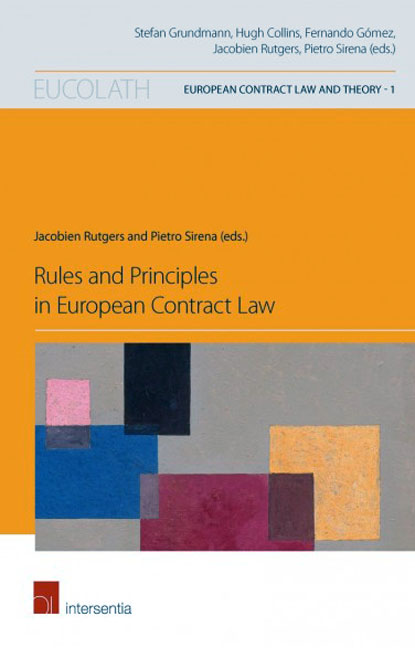Book contents
- Frontmatter
- Contents
- Table of Cases
- List of Authors
- Introduction
- Principles versus Rules in the Emerging European Contract Law
- The ECJ and General Principles Derived from the Acquis Communautaire
- The Principle of Effectiveness and EU Contract Law
- The Principle of Proportionality and European Contract Law
- ‘General Principles’ and ‘Underlying Principles’ in the Proposed Common European Sales Law and their Role in its Interpretation
- Contractual Autonomy and European Private Law
- Good Faith and Reasonableness in European Contract Law
- Benefits to the Defendant as a Measure for Relief: Toward a Specific Rule in European Contract Law?
Introduction
Published online by Cambridge University Press: 28 November 2017
- Frontmatter
- Contents
- Table of Cases
- List of Authors
- Introduction
- Principles versus Rules in the Emerging European Contract Law
- The ECJ and General Principles Derived from the Acquis Communautaire
- The Principle of Effectiveness and EU Contract Law
- The Principle of Proportionality and European Contract Law
- ‘General Principles’ and ‘Underlying Principles’ in the Proposed Common European Sales Law and their Role in its Interpretation
- Contractual Autonomy and European Private Law
- Good Faith and Reasonableness in European Contract Law
- Benefits to the Defendant as a Measure for Relief: Toward a Specific Rule in European Contract Law?
Summary
‘The general principles of Community law have constitutional status while the principle proposed by Audiolux is characterized by a degree of detail requiring legislation to be drafted and enacted at Community level by a measure of secondary Community law. Therefore, the principle proposed by Audiolux cannot be regarded as an independent general principle of Community law.’
These words are part of the ruling of the European Court of Justice in Audiolux, in which the question at stake was whether a minority shareholder in a company under Luxembourg law could rely on the general principle of equal treatment in EU law to secure its position. According to the decision rendered by the Court, general principles of EU law should be distinguished by a constitutional relevance. Examples of this are fundamental rights, equal treatment, nondiscrimination, effective judicial protection and proportionality. For similar reasons, general principles of EU law should not be restricted to a certain area of the legal order, but rather should be applicable in all its possible branches.
More recently, however, the European Court of Justice has increasingly acknowledged and applied ‘general principles of civil law’, relying upon values which are traditionally rooted in and pertain to the domain of private law. Examples of this are full compensation, good faith and restitution of unjustified enrichment.
The principles of EU law have been used by the Court of Justice for many a purpose. First, they are an aid to interpretation with respect to EU and national law falling within the scope of EU law. Both national law and EU law must be interpreted in the light of those principles. Secondly, they can be applied to fill gaps in EU law, and finally they may be a ground for judicial review.
The Commission has long started a discussion about the future of European contract law, in order to overcome the piecemeal approach that had until that point been followed by harmonising national laws through sectorial directives.
- Type
- Chapter
- Information
- Rules and Principles in European Contract Law , pp. 1 - 6Publisher: IntersentiaPrint publication year: 2015



